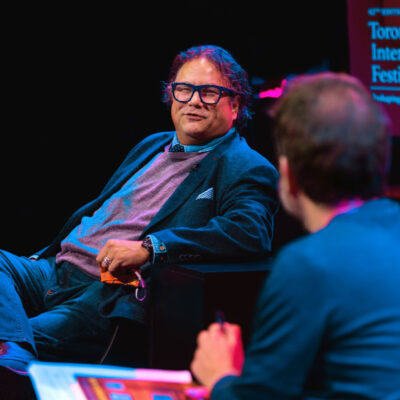
Six Authors on Their Writing Experiences
Six Authors on Their Writing Experiences
6:10am
Saturday, July 27, 2024
During the 42nd Toronto International Festival of Authors, writers of all genres of literature spoke about their experiences with the writing process. From first novels to exploring new topics, advice and experiences were shared that would benefit many aspiring writers. Whether you are taking part in National Novel Writing Month (NaNoWriMo) this November, or you simply enjoy learning more about a writer’s experience, here are six personal stories transcribed from Festival events, below.
Mateo Askaripour, author of Black Buck
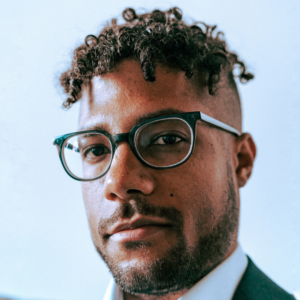 “Black Buck was my third manuscript. I had written two manuscripts, one partially while I was still in the world of startups and sales. Writing for me at that time, back in 2016, became an outlet, and then I turned from writing essays and articles to writing fiction. And I found that, beyond an outlet, it was a very specific form of salvation. So, I tried my hand at writing a novel. I did. No one wanted it. And then at that point, I wasn’t even working at that company anymore, but I didn’t want to feed into this ‘starving artist’ cliché, you know. So, I was consulting with tech startups to make money, helping them build and maintain sales teams. I’d learned a little bit more about writing with the assistance of a book called Plot & Structure and just a lot of trial-and-error. I wrote a second book, which I thought was going to get me in, get me an agent. Nah, no one wanted that one as well. And then I said, you know what, I’m going to write the book that I want, in the way that I want, for the people I want it to resonate with, and that was Black Buck that I began in January 2018, and it worked out.”
“Black Buck was my third manuscript. I had written two manuscripts, one partially while I was still in the world of startups and sales. Writing for me at that time, back in 2016, became an outlet, and then I turned from writing essays and articles to writing fiction. And I found that, beyond an outlet, it was a very specific form of salvation. So, I tried my hand at writing a novel. I did. No one wanted it. And then at that point, I wasn’t even working at that company anymore, but I didn’t want to feed into this ‘starving artist’ cliché, you know. So, I was consulting with tech startups to make money, helping them build and maintain sales teams. I’d learned a little bit more about writing with the assistance of a book called Plot & Structure and just a lot of trial-and-error. I wrote a second book, which I thought was going to get me in, get me an agent. Nah, no one wanted that one as well. And then I said, you know what, I’m going to write the book that I want, in the way that I want, for the people I want it to resonate with, and that was Black Buck that I began in January 2018, and it worked out.”
Transcribed from: A New Way Forward: Mateo Askaripour & Natasha Brown (October 27)
Photo credit: Andrew FifthGod Askaripour.
S. Bear Bergman, author of Special Topics in Being A Human
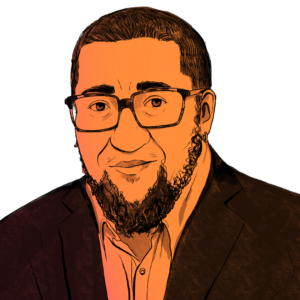 “I would say that I have a bit of a tendency toward constant self-improvement, which is a mixed bag for a writer. Sometimes it’s very hard for me to decide ‘okay, this is done now’ and send it in. There’s a writer named Anne Lamott and she wrote a great book about writing called Bird by Bird and in it she talks about how, you know, finishing a draft is a little bit like putting an octopus to bed. At a certain point, you just have to get like most of the tentacles under the covers and then that’s it. You turn out the light and called it a happy day.”
“I would say that I have a bit of a tendency toward constant self-improvement, which is a mixed bag for a writer. Sometimes it’s very hard for me to decide ‘okay, this is done now’ and send it in. There’s a writer named Anne Lamott and she wrote a great book about writing called Bird by Bird and in it she talks about how, you know, finishing a draft is a little bit like putting an octopus to bed. At a certain point, you just have to get like most of the tentacles under the covers and then that’s it. You turn out the light and called it a happy day.”
Transcribed from: Special Topics in Being a Human: S. Bear Bergman (October 23)
Illustration credit: Saul Freedman-Lawson.
Tziporah Cohen, author of No Vacancy
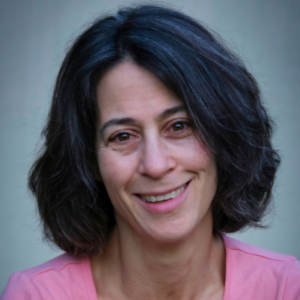 “I can tell you that my biggest challenge was believing that I could do it. I mean, I think I was my own worst enemy in the process. I had never seen myself as a novel writer. I came to writing to write picture books. I started my MFA to write picture books. And even when encouraged to write a novel, I kept saying I don’t write novels, and so I think that was the biggest hurdle for me, was just having the confidence to overcome that hesitancy. And of course, the next biggest challenge, which I’m sure everybody can relate to, is then finding the time and plugging through ’cause it’s hard.”
“I can tell you that my biggest challenge was believing that I could do it. I mean, I think I was my own worst enemy in the process. I had never seen myself as a novel writer. I came to writing to write picture books. I started my MFA to write picture books. And even when encouraged to write a novel, I kept saying I don’t write novels, and so I think that was the biggest hurdle for me, was just having the confidence to overcome that hesitancy. And of course, the next biggest challenge, which I’m sure everybody can relate to, is then finding the time and plugging through ’cause it’s hard.”
Transcribed from: The Jean Little First-Novel Award Shortlist (October 27)
Michelle Good, author of Five Little Indians
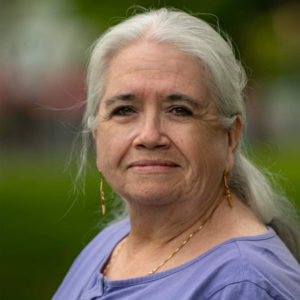 “I think one of the most important things is ‘don’t use too many words’, you know, and I know it sounds simplistic, but know what your story is before you start. Know what your story is, and that doesn’t mean you need to know everything that’s going to turn, but know the heart of your story and then stay true to the heart of your story and, you know, don’t get lost in the weeds. Be true to your story and that applies to developing your characters too.”
“I think one of the most important things is ‘don’t use too many words’, you know, and I know it sounds simplistic, but know what your story is before you start. Know what your story is, and that doesn’t mean you need to know everything that’s going to turn, but know the heart of your story and then stay true to the heart of your story and, you know, don’t get lost in the weeds. Be true to your story and that applies to developing your characters too.”
Transcribed from: 2021 Evergreen Award™ Winner Michelle Good in Conversation (October 22)
Shari Lapena, author of Not a Happy Family
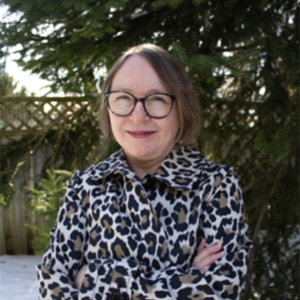 “I think it’s really good to write in secret. If that works for you. It worked for me. I think that everybody, I think a lot of creative people tend to censor themselves too much, and I think if you’re worried about pleasing other people or pleasing someone that knows that you’re writing that can put a lot of pressure on you. . . I don’t really believe in writer’s block, I just think it’s perfectionism getting in the way. So, I think what you should do is forget about perfectionism, forget about people knowing what you’re doing. If you are worried about people judging you, just don’t tell anyone what you’re doing so you can free up your creative impulse. And, you know, don’t worry about it being any good. You really have to get through a bunch of crap before you get the good stuff. And I think if you start writing, you’ll soon find that you start to find your own voice.”
“I think it’s really good to write in secret. If that works for you. It worked for me. I think that everybody, I think a lot of creative people tend to censor themselves too much, and I think if you’re worried about pleasing other people or pleasing someone that knows that you’re writing that can put a lot of pressure on you. . . I don’t really believe in writer’s block, I just think it’s perfectionism getting in the way. So, I think what you should do is forget about perfectionism, forget about people knowing what you’re doing. If you are worried about people judging you, just don’t tell anyone what you’re doing so you can free up your creative impulse. And, you know, don’t worry about it being any good. You really have to get through a bunch of crap before you get the good stuff. And I think if you start writing, you’ll soon find that you start to find your own voice.”
Transcribed from: Kobo in Conversation with Shari Lapena (October 25)
Jesse Wente, author of Unreconciled
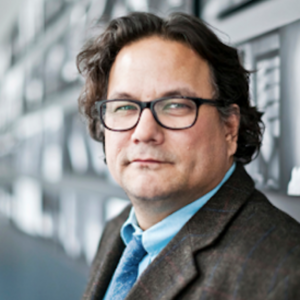 “It took me a while to figure it out. I had never written a book before, obviously. It was a new medium for me. I start the book with the first moment where life of an Indigenous person came up against the myth of Indigenous people in Canada, but really for me, the decision to write the book came at a time I sort of figured it out, or that’s not quite correct, because I haven’t figured that much out. You know, I’ve been asked to write a book several times before, and I always said no. I didn’t know what I would write about, what I had to say. You know, I was doing radio, it felt like I had the space to say whatever I wanted to already. I think it sort of took realizing, coming to a point in that journey of understanding my place in this world, my place within my community, how those two things are both connected, but also at times, at odds. It took that long to get comfortable, to give me the material to write a book. I never thought I would write a book about myself. I always imagine I would write about something else.”
“It took me a while to figure it out. I had never written a book before, obviously. It was a new medium for me. I start the book with the first moment where life of an Indigenous person came up against the myth of Indigenous people in Canada, but really for me, the decision to write the book came at a time I sort of figured it out, or that’s not quite correct, because I haven’t figured that much out. You know, I’ve been asked to write a book several times before, and I always said no. I didn’t know what I would write about, what I had to say. You know, I was doing radio, it felt like I had the space to say whatever I wanted to already. I think it sort of took realizing, coming to a point in that journey of understanding my place in this world, my place within my community, how those two things are both connected, but also at times, at odds. It took that long to get comfortable, to give me the material to write a book. I never thought I would write a book about myself. I always imagine I would write about something else.”
Transcribed from: Unreconciled: Jesse Wente (October 25)
Photo credit: Red Works
During the 42nd Toronto International Festival of Authors, writers of all genres of literature spoke about their experiences with the writing process. From first novels to exploring new topics, advice and experiences were shared that would benefit many aspiring writers. Whether you are taking part in National Novel Writing Month (NaNoWriMo) this November, or you simply enjoy learning more about a writer’s experience, here are six personal stories transcribed from Festival events, below.
Mateo Askaripour, author of Black Buck
 “Black Buck was my third manuscript. I had written two manuscripts, one partially while I was still in the world of startups and sales. Writing for me at that time, back in 2016, became an outlet, and then I turned from writing essays and articles to writing fiction. And I found that, beyond an outlet, it was a very specific form of salvation. So, I tried my hand at writing a novel. I did. No one wanted it. And then at that point, I wasn’t even working at that company anymore, but I didn’t want to feed into this ‘starving artist’ cliché, you know. So, I was consulting with tech startups to make money, helping them build and maintain sales teams. I’d learned a little bit more about writing with the assistance of a book called Plot & Structure and just a lot of trial-and-error. I wrote a second book, which I thought was going to get me in, get me an agent. Nah, no one wanted that one as well. And then I said, you know what, I’m going to write the book that I want, in the way that I want, for the people I want it to resonate with, and that was Black Buck that I began in January 2018, and it worked out.”
“Black Buck was my third manuscript. I had written two manuscripts, one partially while I was still in the world of startups and sales. Writing for me at that time, back in 2016, became an outlet, and then I turned from writing essays and articles to writing fiction. And I found that, beyond an outlet, it was a very specific form of salvation. So, I tried my hand at writing a novel. I did. No one wanted it. And then at that point, I wasn’t even working at that company anymore, but I didn’t want to feed into this ‘starving artist’ cliché, you know. So, I was consulting with tech startups to make money, helping them build and maintain sales teams. I’d learned a little bit more about writing with the assistance of a book called Plot & Structure and just a lot of trial-and-error. I wrote a second book, which I thought was going to get me in, get me an agent. Nah, no one wanted that one as well. And then I said, you know what, I’m going to write the book that I want, in the way that I want, for the people I want it to resonate with, and that was Black Buck that I began in January 2018, and it worked out.”
Transcribed from: A New Way Forward: Mateo Askaripour & Natasha Brown (October 27)
Photo credit: Andrew FifthGod Askaripour.
S. Bear Bergman, author of Special Topics in Being A Human
 “I would say that I have a bit of a tendency toward constant self-improvement, which is a mixed bag for a writer. Sometimes it’s very hard for me to decide ‘okay, this is done now’ and send it in. There’s a writer named Anne Lamott and she wrote a great book about writing called Bird by Bird and in it she talks about how, you know, finishing a draft is a little bit like putting an octopus to bed. At a certain point, you just have to get like most of the tentacles under the covers and then that’s it. You turn out the light and called it a happy day.”
“I would say that I have a bit of a tendency toward constant self-improvement, which is a mixed bag for a writer. Sometimes it’s very hard for me to decide ‘okay, this is done now’ and send it in. There’s a writer named Anne Lamott and she wrote a great book about writing called Bird by Bird and in it she talks about how, you know, finishing a draft is a little bit like putting an octopus to bed. At a certain point, you just have to get like most of the tentacles under the covers and then that’s it. You turn out the light and called it a happy day.”
Transcribed from: Special Topics in Being a Human: S. Bear Bergman (October 23)
Illustration credit: Saul Freedman-Lawson.
Tziporah Cohen, author of No Vacancy
 “I can tell you that my biggest challenge was believing that I could do it. I mean, I think I was my own worst enemy in the process. I had never seen myself as a novel writer. I came to writing to write picture books. I started my MFA to write picture books. And even when encouraged to write a novel, I kept saying I don’t write novels, and so I think that was the biggest hurdle for me, was just having the confidence to overcome that hesitancy. And of course, the next biggest challenge, which I’m sure everybody can relate to, is then finding the time and plugging through ’cause it’s hard.”
“I can tell you that my biggest challenge was believing that I could do it. I mean, I think I was my own worst enemy in the process. I had never seen myself as a novel writer. I came to writing to write picture books. I started my MFA to write picture books. And even when encouraged to write a novel, I kept saying I don’t write novels, and so I think that was the biggest hurdle for me, was just having the confidence to overcome that hesitancy. And of course, the next biggest challenge, which I’m sure everybody can relate to, is then finding the time and plugging through ’cause it’s hard.”
Transcribed from: The Jean Little First-Novel Award Shortlist (October 27)
Michelle Good, author of Five Little Indians
 “I think one of the most important things is ‘don’t use too many words’, you know, and I know it sounds simplistic, but know what your story is before you start. Know what your story is, and that doesn’t mean you need to know everything that’s going to turn, but know the heart of your story and then stay true to the heart of your story and, you know, don’t get lost in the weeds. Be true to your story and that applies to developing your characters too.”
“I think one of the most important things is ‘don’t use too many words’, you know, and I know it sounds simplistic, but know what your story is before you start. Know what your story is, and that doesn’t mean you need to know everything that’s going to turn, but know the heart of your story and then stay true to the heart of your story and, you know, don’t get lost in the weeds. Be true to your story and that applies to developing your characters too.”
Transcribed from: 2021 Evergreen Award™ Winner Michelle Good in Conversation (October 22)
Shari Lapena, author of Not a Happy Family
 “I think it’s really good to write in secret. If that works for you. It worked for me. I think that everybody, I think a lot of creative people tend to censor themselves too much, and I think if you’re worried about pleasing other people or pleasing someone that knows that you’re writing that can put a lot of pressure on you. . . I don’t really believe in writer’s block, I just think it’s perfectionism getting in the way. So, I think what you should do is forget about perfectionism, forget about people knowing what you’re doing. If you are worried about people judging you, just don’t tell anyone what you’re doing so you can free up your creative impulse. And, you know, don’t worry about it being any good. You really have to get through a bunch of crap before you get the good stuff. And I think if you start writing, you’ll soon find that you start to find your own voice.”
“I think it’s really good to write in secret. If that works for you. It worked for me. I think that everybody, I think a lot of creative people tend to censor themselves too much, and I think if you’re worried about pleasing other people or pleasing someone that knows that you’re writing that can put a lot of pressure on you. . . I don’t really believe in writer’s block, I just think it’s perfectionism getting in the way. So, I think what you should do is forget about perfectionism, forget about people knowing what you’re doing. If you are worried about people judging you, just don’t tell anyone what you’re doing so you can free up your creative impulse. And, you know, don’t worry about it being any good. You really have to get through a bunch of crap before you get the good stuff. And I think if you start writing, you’ll soon find that you start to find your own voice.”
Transcribed from: Kobo in Conversation with Shari Lapena (October 25)
Jesse Wente, author of Unreconciled
 “It took me a while to figure it out. I had never written a book before, obviously. It was a new medium for me. I start the book with the first moment where life of an Indigenous person came up against the myth of Indigenous people in Canada, but really for me, the decision to write the book came at a time I sort of figured it out, or that’s not quite correct, because I haven’t figured that much out. You know, I’ve been asked to write a book several times before, and I always said no. I didn’t know what I would write about, what I had to say. You know, I was doing radio, it felt like I had the space to say whatever I wanted to already. I think it sort of took realizing, coming to a point in that journey of understanding my place in this world, my place within my community, how those two things are both connected, but also at times, at odds. It took that long to get comfortable, to give me the material to write a book. I never thought I would write a book about myself. I always imagine I would write about something else.”
“It took me a while to figure it out. I had never written a book before, obviously. It was a new medium for me. I start the book with the first moment where life of an Indigenous person came up against the myth of Indigenous people in Canada, but really for me, the decision to write the book came at a time I sort of figured it out, or that’s not quite correct, because I haven’t figured that much out. You know, I’ve been asked to write a book several times before, and I always said no. I didn’t know what I would write about, what I had to say. You know, I was doing radio, it felt like I had the space to say whatever I wanted to already. I think it sort of took realizing, coming to a point in that journey of understanding my place in this world, my place within my community, how those two things are both connected, but also at times, at odds. It took that long to get comfortable, to give me the material to write a book. I never thought I would write a book about myself. I always imagine I would write about something else.”
Transcribed from: Unreconciled: Jesse Wente (October 25)
Photo credit: Red Works
Jesse Wente on stage at Harbourfront Centre during #FestofAuthors21.
6:10am
Saturday, July 27, 2024